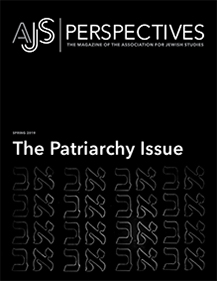"Who lives, who dies, who tells your story?”i
These words repeat in the closing song of the smash hit Hamilton. The title character laments that “every other founding father’s story gets told”—but Hamilton’s? Who will tell his story? After all, “you have no control,” he frets.
Thanks to Eliza, the wife who survives him by fifty years, Hamilton’s story is told. Eliza organizes his papers and letters and, overcoming many obstacles, publishes his biography.
This issue of AJS Perspectives is filled with stories. There are first-person stories that give voice to searing pain and the unbidden knowing that is born of it. There are third-person accounts of lost voices and lost stories whose owners never deemed them worthy of the telling. There are familiar, never-lost stories from classic texts that, when read with new eyes, become fragile, crumble, and then vanish, only to re-emerge as something new.
There are stories about those empowered to silence texts by refusing to acknowledge what they say and show; stories about those empowered to silence people by refusing to acknowledge their experience, their wisdom, their truth. There are stories about the wounds that such power inflicts not only on those against whom it is wielded but also on its wielders.
There are stories about invisible barriers and glass ceilings and the cycles of exhaustion and erasure they generate. There are stories about barriers that suddenly gave way and the coalitions that formed in their place. In short, Jewish stories that are universal stories.
Perhaps most important, there are stories about changing the story: prescriptions for better practices in teaching, publishing, translating, editing, conferencing, with the hope that the story that will one day be told about us will be different.
If so, then Hamilton was wrong. Perhaps you can control the story. After all, the play ends with Eliza, who steps forward to sing, “I put myself back in the narrative.” Standing center stage, she tells us her story, the story of a founding mother. She tells us that she raised money for the Washington Monument, raised her voice against slavery, and—the labor she says she’s proudest of—raised hundreds of children by founding and directing the first private orphanage in New York City. Still she frets, “when my time is up, have I done enough?”—to tell the story, the twinned story of Alexander and Eliza?
The Patriarchy Issue of AJS Perspectives coincides with important developments in the association that are not unrelated to the theme of the issue and that will have a shaping influence on the unfolding story of the AJS. Over the past fifteen months, the AJS leadership has reviewed the association’s story—taking a hard look at the ways our own processes and structures are implicated in power dynamics that negatively affect the experience of our members. And we have worked to change that story. A major step in that direction occurred in December 2018, when the AJS board approved a set of painstakingly developed informal and formal procedures for handling complaints of sexual misconduct relating to AJS-sponsored programs or activities.
We must now put these procedures into practice, and to that end we have established two main goals that will be accomplished before the 2019 annual conference: to develop and implement the program of intensive training required by the ombudspersons and other Sexual Misconduct Committee members responsible for operationalizing our new procedures; and to develop a variety of online resources and educational materials to support and guide our members around matters of sexual misconduct. This is how we change the story.
One reads the pieces in this issue and it is clear: we must do a better job shaping a better story through the daily labor of better practices, better procedures, better listening, better thinking. We must make the AJS, and the field of Jewish Studies as a whole, more fair, more inclusive, and more diverse.
The AJS’s next fifty years must be a story worthy of the telling. Let us not be left fretting that we haven’t done enough.
“And when you’re gone,
who remembers your name?
Who keeps your flame?
Who tells your story?”
Christine Hayes
Yale University
i From the musical Hamilton, by Lin-Manuel Miranda (PhD h.c., Yeshiva University, 2009), © 5000 Broadway Music.

